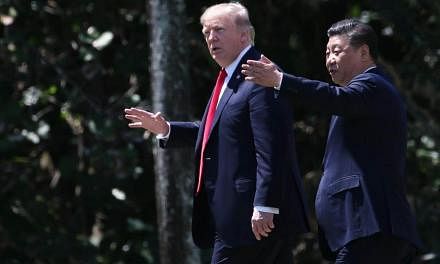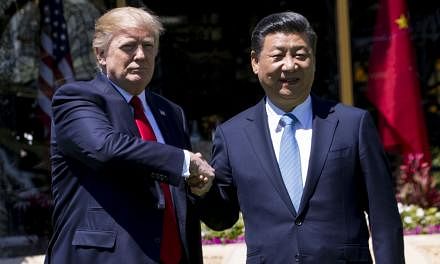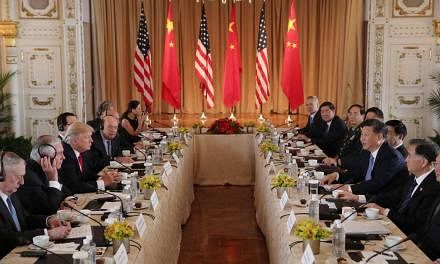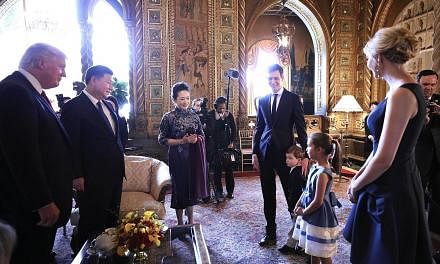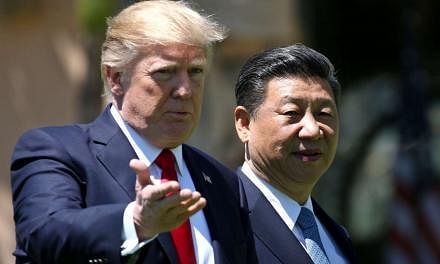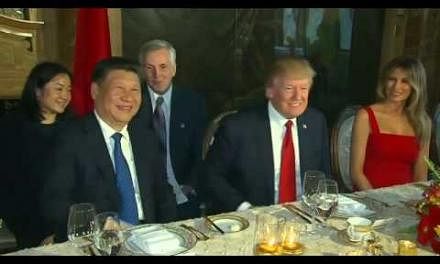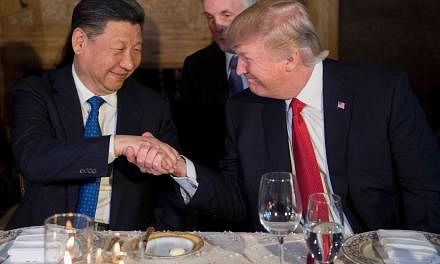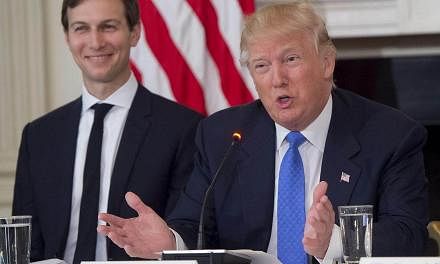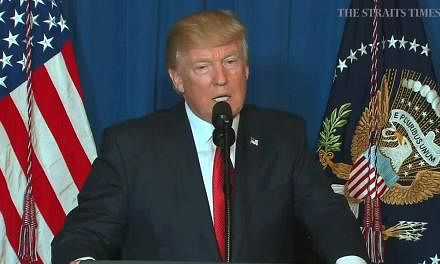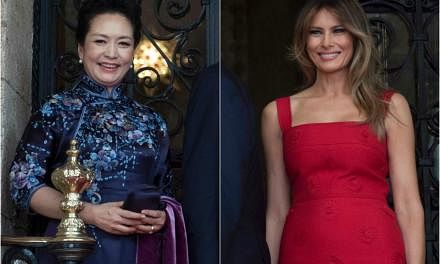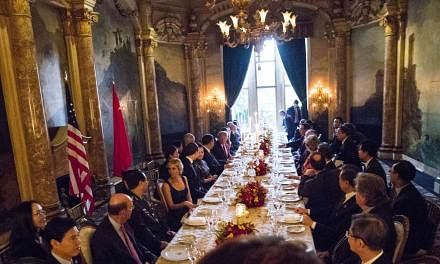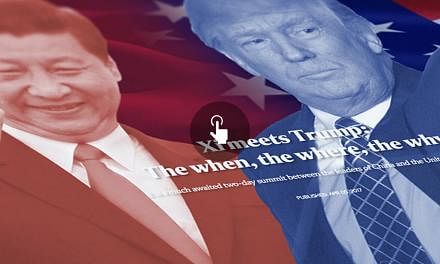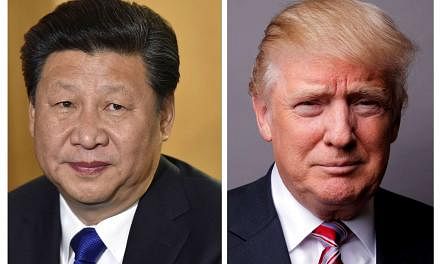WASHINGTON/BEIJING (REUTERS) - When US President Donald Trump meets Chinese President Xi Jinping this week, their summit will be marked not only by deep policy divisions but a clash of personalities between America's brash "tweeter-in-chief" and Beijing's cautious, calculating leader.
They may have one thing in common: their rhetoric about restoring their nations to greatness. But the two men differ in almost every other respect, from their political styles to their diplomatic experience, adding uncertainty to what has been called the world's most important bilateral relationship.
Five months after his election on a stridently anti-China platform, Mr Trump appears to have set himself on a course for collision, rather than conciliation, with Mr Xi, raising doubts as to whether the world's two biggest economies can find common ground.
Topping the agenda at Mr Trump's Mar-a-Lago resort in Florida will be whether he will make good on his threat to use crucial US-China trade ties to pressure Beijing to do more to rein in its nuclear-armed neighbor North Korea, which is working to develop missiles capable of hitting the United States.
Mr Trump, a 70-year-old former real estate magnate with no foreign policy experience before entering the White House, has tweeted that it will be a "very difficult" meeting with the veteran Communist Party leader seven years his junior, given Chinese trade practices he says are killing US jobs.
He has also demanded that Beijing do more to "solve" the North Korean problem - his biggest national security challenge - or he will act alone to deal with Pyongyang's nuclear and missile programmes.
Some White House aides believe Mr Trump's son-in-law and senior adviser Jared Kushner could be an influential moderating voice on how he handles Mr Xi in their talks on Thursday (April 6) and Friday. Contacts between Mr Kushner and China's US envoy helped smooth the way for the meeting, according to current and former US officials.
Even so, what worries the protocol-conscious Chinese more than policy clashes is the risk that the unpredictable Mr Trump could publicly embarrass Mr Xi, after several foreign leaders experienced awkward moments with the new US president.
"Ensuring President Xi does not lose face is a top priority for China," a Chinese official said.
US presidents' meetings with their Chinese counterparts are usually more tightly scripted than with other foreign leaders, something Chinese officials insist on to make sure they are treated with the decorum they believe befits a global power.
This summit should offer a study in contrasts: Mr Trump impatient, outspoken and prone to angry tweet-storms; Mr Xi, outwardly calm and measured, with no known social media presence.
Their shared nationalist tendencies could aggravate friction between their countries, which are increasingly global rivals.
Mr Trump insists the US has been cheated economically for decades by countries like China and must regain its lustre, while Mr Xi wants China, once an ancient empire, to be able to flex its muscles on the world stage.
"Xi and Trump are not natural friends," said a former senior US official specialising in Asia. "The question is when Trump's 'Make America Great Again' hits Xi's 'Chinese Dream', what's the result?"
WON'T PULL PUNCHES
It remains unclear how far Mr Trump will go in translating populist rhetoric into policy that steps up pressure on China, given the risk of a trade war neither country can afford.
But aides say he won't pull his punches, especially for trade, on which he has held an outspoken view for decades.
This adds to doubts as to whether the two leaders can find common ground on North Korea and China's expansive claims in the South China Sea.
Some analysts question whether Mr Trump can get the better of Mr Xi, who was born into a life of politics and has a reputation for being a tough tactician.
"Xi's performed pretty well in these types of environments," said Mr Christopher Johnson, a China expert and former CIA analyst at Washington's Centre for Strategic and International Studies.
While Mr Trump has been in office little more than 10 weeks, Mr Xi has honed his US strategy since assuming the Chinese leadership in 2013.
The son of a revolutionary leader, Mr Xi has sought to project the image internationally of a strong advocate of globalisation at a time when Mr Trump has stoked fears of US protectionism.
Still, Chinese officials are mindful of the pitfalls if Mr Trump veers off-script.
Japanese Prime Minister Shinzo Abe found himself in a long, uncomfortable handshake at the White House in February, and Mr Trump appeared to ignore German Chancellor Angela Merkel's offer of a handshake during their meeting last month.
An acrimonious call between Mr Trump and Australian Prime Minister Malcolm Turnbull caused particular concern in Beijing, officials there say.
Still, the decision to hold a summit so early in Mr Trump's presidency suggests both Washington and Beijing see the value of trying to build a personal relationship between the two leaders.
Mr Trump goes into the meeting with significant gaps in his team of Asia advisers and his China policy still not fully formulated.
Hardliners like trade adviser Peter Navarro, who authored a book Death By China, have feuded over the administration's approach to China with more pragmatic aides such as economic adviser Gary Cohn, a former Goldman Sachs president, current and former US officials say.
Administration officials argue that Mr Trump can use his "Art of the Deal" sales techniques to convince Mr Xi that China needs the US more than the US needs China, especially when it comes to market access.
But analysts say the Chinese are shrewd enough at geopolitics to fend off US demands. Mr Xi may also see Mr Trump politically weakened by his high-profile legislative failure on healthcare as well as his low public approval ratings.
Mr Trump has already backed down on China's most sensitive issue - Taiwan - having first infuriated Beijing by suggesting he might not abide by Washington's long-standing "one China" policy. Mr Trump may now feel he is owed a favour in return.
A fence-mending phone call in February was arranged by Mr Kushner and China's US ambassador Cui Tiankai, officials say, after Cui invited Mr Trump's daughter Ivanka to the Chinese Embassy's Chinese New Year reception, where her daughter sang in Mandarin.
Both sides are keeping expectations low for tangible outcomes from the summit, billed as informal "get to know you" meetings similar to the 2013 Sunnylands summit in California between Mr Xi and Mr Trump's predecessor, Mr Barack Obama.
And whatever else, unlike Mr Abe's February visit to Mar-a-Lago, there will be no golf diplomacy: China's Communist Party associates golf with shady dealings and has sought to stop officials from playing it as part of Mr Xi's fight against corruption.

